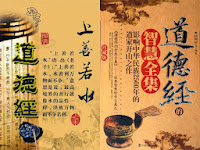 In my blog: Virtue – Morality – Ethics and leadership I wrote that virtue motivates and morals and ethics constrain. To support that statement here I’d like to describe virtue through Chinese ancient text ‘Dào DéJīng’.
In my blog: Virtue – Morality – Ethics and leadership I wrote that virtue motivates and morals and ethics constrain. To support that statement here I’d like to describe virtue through Chinese ancient text ‘Dào DéJīng’. Dé is conventionally translated as ‘virtue’ or ‘power,’ and refers to how the Way or Dào functions, or literally “walks” throughout the visible world. ‘Moral authority’ is probably the closest modern English equivalent to Dé. It was an opening stanza in the oldest version of Dào Dé Jīng, now it is introduced in stanza 38 that describes virtue:
Dé is conventionally translated as ‘virtue’ or ‘power,’ and refers to how the Way or Dào functions, or literally “walks” throughout the visible world. ‘Moral authority’ is probably the closest modern English equivalent to Dé. It was an opening stanza in the oldest version of Dào Dé Jīng, now it is introduced in stanza 38 that describes virtue:
High virtue by obliging not - acquires moral force.
Low virtue obliges always and thus lacks moral force.
High virtue neither strives nor acts for its own ends.
Low virtue does not strive but acts for its own ends.
High kindness does strive but not for its own ends.
High service also strives and does so for its ends.
High ritual not only strives but compliance failing stops at nothing to compel conformance.
Thus the loss of the Way meant the advent of virtue.
The loss of virtue, the advent of kindness.
The loss of kindness, the advent of service.
The loss of service, the advent of ritual rule.
Ritual rule turned loyal trust to deceit, leading to disorder.
All that has been learned adorns the Wayand engenders delusion.
Hence those strong and true keep commitment
shun deceit, stay with the kernel that’s real and shun flowery adornment, choosing the first, refusing the last. (Moss)
At the first glance the text is so full of meaning that it requires a lot of effort for “the western mind” to understand it. That is why I’d like to offer a little bit of explanation. First line is dedicated to learn that if you have a high virtue your do not ask a favor for your deed. The second stance demonstrates that only those that do not possess virtue ask for a contra favor for their acts. Therefore, favor done by favor, in sheer calculation of return is not a virtue behavior. With the consecutive lines the stanza reinforce that the real virtue is connected to the Way (Dào) that one has to follow. It is a path on which one serves but never for his own benefit. After striving to achieve higher service instead of short term gain, stanza shows the Way until the real object of critique has been reached - “the ritual” in the twelve stance. For Lǎo Zǐ, the ritual represents the complete externalization and hence falsification of human relations. Ritual, cherished by all Confucians, entails exchange through mutual obligation: one side acts and must act demonstratively in expectation of reciprocal favor—in order to oblige favor. And, for Lǎo Zǐ, this is not a kind of virtue to be approached. It is the path to disorder where all, to gain something, follow the routine of give and take.

Ritual from those times could in our times be referred to as the ‘administrative rules’ that are more and more used all over the world. But is it not that the current situation is exactly what Lǎo Zǐ warns us to avoid?
Unlike ritual, Dé is an inner quality. It is ‘a perfect mastery that works like the water’ which in Chinese culture represents a symbol of life. Water takes on the form in which it is held and moves in the path of least resistance. The power of transition is represented by its forms: liquid, to solid, to vapor – water is the epitome symbol for metamorphosis and philosophical recycling. Therefore, water is popular and related to the idea of how to perform the role of leadership.
In my book, Leadership by Virtue, I have addressed both, a personal virtue (Dé) and the Way (Dào). Both are very important and all-embracing foundations to perform and to be an exceptional leader, to achieve such a leadership style that keeps away unneeded administration.

No comments:
Post a Comment
Note: Only a member of this blog may post a comment.